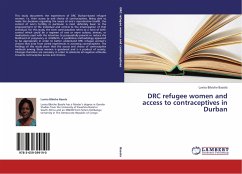This study documents the experiences of DRC Durban-based refugee women; i.e. their access to and choice of contraceptives. Being able to make the decisions regarding the issues of one s reproductive health, the control of one s fertility in particular is most definitely basic to the empowerment of the individual and central to the emancipation of that individual. For this study, the term contraceptives refers to a form of birth control which could be a regimen of one or more actions, devices, or medications used with the intention to purposefully prevent or reduce the likelihood of pregnancy or childbirth. A qualitative methodology appeared to be appropriate in order to better understand DRC refugee women s choices that arise from varied experiences in accessing contraceptives. The findings of this study show that the access and choice of contraceptive methods among these women is gendered and is a product of society. Changes therefore are necessary in order to eliminate all negative attitudes towards contraceptive access and choices.
Bitte wählen Sie Ihr Anliegen aus.
Rechnungen
Retourenschein anfordern
Bestellstatus
Storno

